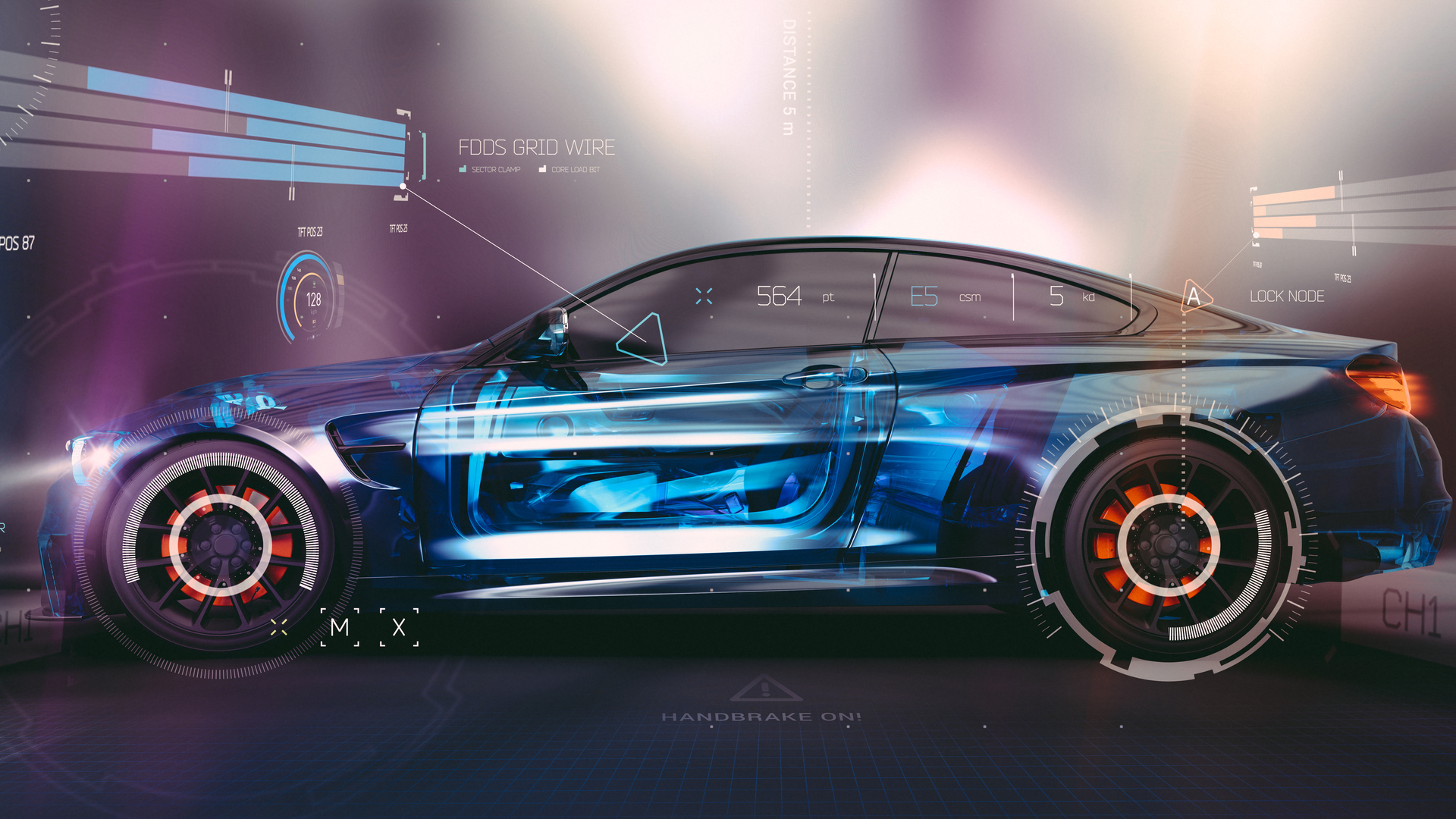Collision Repair Technology Certificate Program Near You in Jamaica, New York
Certificate Program (48 Credits)
Are you considering a career in collision repair technology? Choosing the right auto body school is an important first step. At NYADI The College of Transportation Technology, we offer a Collision Repair Technology certificate program that helps prepare students for careers in car repair. Learn more about our auto body school near you in Jamaica, New York.

The Collision Repair Technology Certificate Program at NYADI is designed to provide students with the technical knowledge and hands-on experience required to begin a career in the collision repair industry. Students will gain foundational and advanced skills in structural and non-structural repair, refinishing, welding, and damage analysis. The program is meant to prepare students for Automotive Service Excellence certification.
Program benefits include:
- Professional instructors with real-world experience and ASE certifications
- A curriculum that is continuously updated to reflect current industry standards and vehicle technologies
- Strong faculty-to-student ratio, ensuring personalized instruction and support
- Open enrollment, allowing any qualified applicant to pursue training in a high-demand field.
At NYADI, our admissions team ensures students meet the program requirements before enrollment. We also offer financial aid opportunities to students who qualify and career services to help students succeed in job seeking and beyond.
The Collision Repair Technology Certificate Program offers a focused, career-driven curriculum designed to prepare students for entry-level roles in the collision repair industry. The program consists of 48 credits and can be completed in:
- Approximately 13 months for full-time students
- Approximately 21 months for part-time students
This program prepares students for ASE certification and I-CAR Platinum Certification in Non-Structural and Refinish ProLevel. Instruction is delivered by ASE-certified professionals with extensive industry experience.
NYADI has partnered with leading manufacturers and organizations to offer factory certifications from:
- Mopar
- Ford
- Toyota
- NC3
- ALLDATA
Graduates will be equipped with the technical skills and industry credentials needed to pursue employment in auto body shops, dealerships, and collision repair centers.
Specializing in collision repair is a smart choice for people pursuing a career in the automotive industry. As vehicle technology continues to evolve and the number of vehicles on the road increases, the demand for skilled collision repair technicians is expected to grow significantly. Graduates of NYADI’s Collision Repair Technology certificate program are well-positioned to take advantage of these opportunities.
Potential career paths may include:
- Auto parts manager or shop owner
- Automotive service technician
- Braking system specialist
- Electrical systems specialist
- Heating and air conditioning specialist
- Master collision repair technician
- Service advisor
- Technical representative
Students also benefit from access to NYADI’s career services department, which provides job placement assistance, resume support, and interview preparation to help graduates transition into the workforce with confidence. In addition to technical training, NYADI offers an Employment Skill Enhancement Program that helps students strengthen essential workplace skills such as math and communication, making graduates more competitive in the job market.
According to ZipRecruiter, the average annual salary for collision repair technicians is approximately $60,068, though earnings can vary based on location, experience, and education level. Average hourly pay in the Jamaica, NY, area is $30.
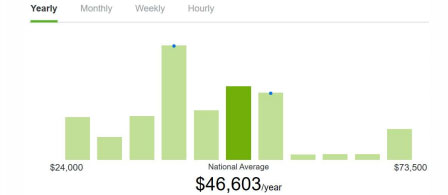
NYADI is committed to providing equal access to education and welcomes applicants regardless of race, color, religion, age, gender, creed, national origin, sexual orientation, disability, or marital status.
To be considered for admission, applicants must meet the following criteria:
- Possess a high school diploma or a recognized high school equivalency diploma
- Demonstrate proficiency in reading and writing in English
- Complete an initial admissions interview with a NYADI Admissions Representative
- Be at least 18 years old at the time of enrollment
Please note: Applicants who are 17 years old may be admitted only with parental or guardian consent.
AT100 – Performance Fundamentals
CR100 – Welding and Cutting
CR102 – Structural Analysis and Repair
AT102 – Steering and Suspension Systems
AT108 – Automotive Electrical Foundations
CR103 – Unibody Analysis and Repair
AT103 – Braking Systems
CR104 – Non-Structural: Preparation & Plastics
AT110 – Electrical/Electronic Systems
AT112 – Engine Electronics
CR105 – Non-Structural: Panel Analysis & Repair
CR106 – Non-Structural: Body Filling
CR110 – Introduction to Refinishing
AT201 – Advanced Undercarriage
AT202 – Advanced Electronic Systems
AT215 – Climate Control
AT100 – Performance Fundamentals
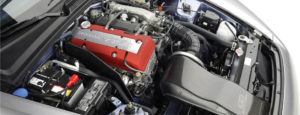 This course introduces the student to the fundamentals of engine operation. Students will learn to identify engine components and to have a thorough understanding of the four-stroke cycle principle. Once engine operating principles are understood, the student will then learn to properly identify engine mechanical problems and perform pinpoint testing using state-of the-art equipment and diagnostic procedures.
This course introduces the student to the fundamentals of engine operation. Students will learn to identify engine components and to have a thorough understanding of the four-stroke cycle principle. Once engine operating principles are understood, the student will then learn to properly identify engine mechanical problems and perform pinpoint testing using state-of the-art equipment and diagnostic procedures.
CR100 – Welding & Cutting
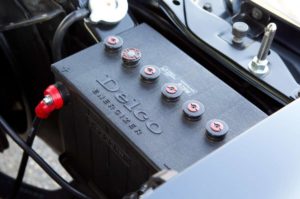 Students will learn welding techniques using MIG and arc welders and how to safely use oxy-acetylene. Students will learn how to identify the proper weld to use in different situations and how to join the different types of metal.
Students will learn welding techniques using MIG and arc welders and how to safely use oxy-acetylene. Students will learn how to identify the proper weld to use in different situations and how to join the different types of metal.
CR102 – Structural Analysis & Repair
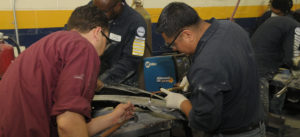 This class will focus on repairing structural damage to vehicles with frame type chassis. Students will learn how to straighten or replace damaged frame components using a frame machine.
This class will focus on repairing structural damage to vehicles with frame type chassis. Students will learn how to straighten or replace damaged frame components using a frame machine.
AT102 – Steering & Suspension Systems
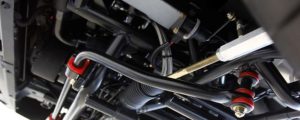 This course provides classroom and laboratory hands-on activities where students gain a thorough understanding of the theory, construction and design of vehicle steering and suspension systems. Topics discussed in this course include tires, wheels, wheel balance, wheel bearings and hubs.
This course provides classroom and laboratory hands-on activities where students gain a thorough understanding of the theory, construction and design of vehicle steering and suspension systems. Topics discussed in this course include tires, wheels, wheel balance, wheel bearings and hubs.
AT108 – Automotive Electrical Foundations
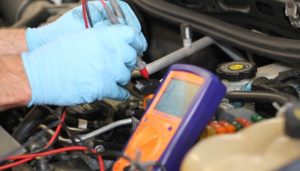 This course combines lecture and laboratory hands-on activities, focusing on the fundamentals of an automobile electrical system. Emphasis will be placed on direct current electricity, basic electrical theory, series and parallel circuits, power distribution, electrical test equipment and the understanding of wiring diagrams.
This course combines lecture and laboratory hands-on activities, focusing on the fundamentals of an automobile electrical system. Emphasis will be placed on direct current electricity, basic electrical theory, series and parallel circuits, power distribution, electrical test equipment and the understanding of wiring diagrams.
CR103 – Unibody Analysis & Repair
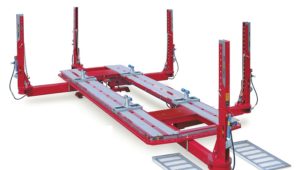 This course combines lecture and laboratory hands-on activities, focusing on the fundamentals of unibody type chassis damage and repaired. Students will learn to properly measure, straighten and align body panels while using the frame machine and to locate hidden damages.
This course combines lecture and laboratory hands-on activities, focusing on the fundamentals of unibody type chassis damage and repaired. Students will learn to properly measure, straighten and align body panels while using the frame machine and to locate hidden damages.
AT103 – Braking Systems
 In this course students are provided classroom and laboratory hands-on activities concerning the fundamentals of hydraulics and how it relates to a vehicle’s braking system. Master cylinders and power assist units will be discussed, diagnosed and repaired. Disc and drum brakes will be discussed, diagnosed, serviced and repaired.
In this course students are provided classroom and laboratory hands-on activities concerning the fundamentals of hydraulics and how it relates to a vehicle’s braking system. Master cylinders and power assist units will be discussed, diagnosed and repaired. Disc and drum brakes will be discussed, diagnosed, serviced and repaired.
CR104 – Non-Structural: Preparation & Plastics
 In this course students are provided classroom and laboratory hands-on activities concerning the preparation of body panels for repair. This will include the removal of trim and molding and protecting non-damaged panels. Repairs of rubber panels and bumpers will be demonstrated and students will learn how to repair movable glass.
In this course students are provided classroom and laboratory hands-on activities concerning the preparation of body panels for repair. This will include the removal of trim and molding and protecting non-damaged panels. Repairs of rubber panels and bumpers will be demonstrated and students will learn how to repair movable glass.
AT110 – Electrical/Electronic Systems
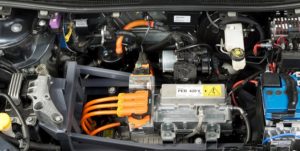 This course provides classroom and laboratory hands-on activities where students building on material learned in AT108 Automotive Electrical Foundations use wiring diagrams to examine headlight, taillight, stoplight and turn/hazard light for operation and repair. Students are taught to use advanced diagnostic techniques to diagnose and repair electrical circuits associated with instrumentation, horn systems and wiper/washer systems. Students will learn on modern training aids using factory service procedures
This course provides classroom and laboratory hands-on activities where students building on material learned in AT108 Automotive Electrical Foundations use wiring diagrams to examine headlight, taillight, stoplight and turn/hazard light for operation and repair. Students are taught to use advanced diagnostic techniques to diagnose and repair electrical circuits associated with instrumentation, horn systems and wiper/washer systems. Students will learn on modern training aids using factory service procedures
AT112 – Engine Electronics
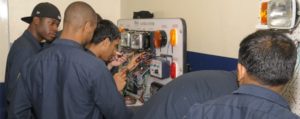 This lecture/laboratory course utilizes the students’ prior understanding of electrical/electronic principles to better comprehend the complex electronically controlled systems used to monitor engine operation and emission compliance. Additionally students will study the theory of operation, design and problem diagnosis of modern ignition systems.
This lecture/laboratory course utilizes the students’ prior understanding of electrical/electronic principles to better comprehend the complex electronically controlled systems used to monitor engine operation and emission compliance. Additionally students will study the theory of operation, design and problem diagnosis of modern ignition systems.
CR105 – Non-Structural: Panel Analysis & Repair
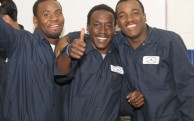 In this course students are provided classroom and laboratory hands-on activities concerning the removal, repair, replacement and adjustment of outer body panels. This will include the repair and alignment of doors, tailgates, trunk lids, hoods and fenders.
In this course students are provided classroom and laboratory hands-on activities concerning the removal, repair, replacement and adjustment of outer body panels. This will include the repair and alignment of doors, tailgates, trunk lids, hoods and fenders.
CR110 – Introduction to Refinishing
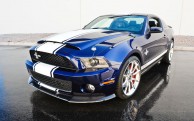 This course provides classroom and laboratory hands-on activities where the student is taught the proper procedures for using automotive refinishing equipment and the materials used in surface preparation and finish application. Emphasis is placed on personal safety, refinishing equipment and materials, surface preparation, masking, application techniques and other related topics.
This course provides classroom and laboratory hands-on activities where the student is taught the proper procedures for using automotive refinishing equipment and the materials used in surface preparation and finish application. Emphasis is placed on personal safety, refinishing equipment and materials, surface preparation, masking, application techniques and other related topics.
CR106 – Non-Structural: Body Filling
 This course provides classroom and laboratory hands-on activities where students gain a thorough understanding of the art of body filling. Panel straightening, body filling and proper sanding techniques will be the focus of this course.
This course provides classroom and laboratory hands-on activities where students gain a thorough understanding of the art of body filling. Panel straightening, body filling and proper sanding techniques will be the focus of this course.
AT215 – Climate Control
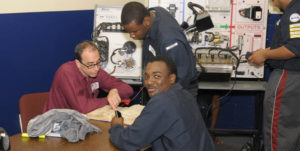 This course provides classroom and laboratory hands-on activities concerning the theory and operation of heating and air conditioning systems. Students will learn about heat transfer, temperature/pressure relationships and control systems. Heating, air conditioning and passenger comfort will be looked at using multi-zone automatic climate control trainers.
This course provides classroom and laboratory hands-on activities concerning the theory and operation of heating and air conditioning systems. Students will learn about heat transfer, temperature/pressure relationships and control systems. Heating, air conditioning and passenger comfort will be looked at using multi-zone automatic climate control trainers.
AT201 – Advanced Undercarriage
 This course combines classroom and laboratory hands-on activities concerning the design, construction and operation of the various types of anti-lock braking systems and traction/stability control systems. The student will also learn the principles of front and four wheel alignment and perform wheel alignments using computerized four-wheel alignment machines.
This course combines classroom and laboratory hands-on activities concerning the design, construction and operation of the various types of anti-lock braking systems and traction/stability control systems. The student will also learn the principles of front and four wheel alignment and perform wheel alignments using computerized four-wheel alignment machines.
AT202 – Advanced Electrical Systems
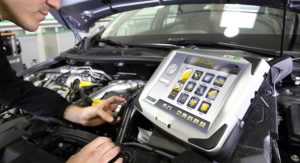 This is a comprehensive lecture and laboratory class which builds on the two previous electrical/electronic courses. Emphasis is placed on the theory, operation, component identification and repair of audio and entertainment systems, power accessories such as power windows and locks, keyless entry, anti-theft systems and cruise control systems.
This is a comprehensive lecture and laboratory class which builds on the two previous electrical/electronic courses. Emphasis is placed on the theory, operation, component identification and repair of audio and entertainment systems, power accessories such as power windows and locks, keyless entry, anti-theft systems and cruise control systems.
Explore Automotive Training Programs Near You in Jamaica, New York
Take the first step toward a rewarding career in the automotive industry with NYADI in Jamaica, NY. Our automotive training programs are designed to provide comprehensive hands-on training, preparation for industry-recognized certifications, and the support you need to succeed.
NYADI offers flexible scheduling, experienced instructors, and financial aid for those who qualify. Explore NYADI today and choose us as your auto body repair school. Contact us or call us today to learn more about this program or how it prepares you for ASE certification.
FAQ About Our Collision Repair Program
How long does it take to complete the Collision Repair Technology certificate program?
The program consists of 48 credits and can be completed in approximately 13 months for full-time students or 21 months for part-time students.
What certifications can I earn through this program?
Students are prepared for ASE certification and I-CAR Platinum Certification in Non-Structural and Refinish ProLevel. NYADI also offers factory certifications through partnerships with Mopar, Ford, Toyota, NC3, and ALLDATA.
Is financial aid available?
Yes, financial aid is available to eligible students. NYADI’s financial aid counselors are available to assist applicants throughout the process.
